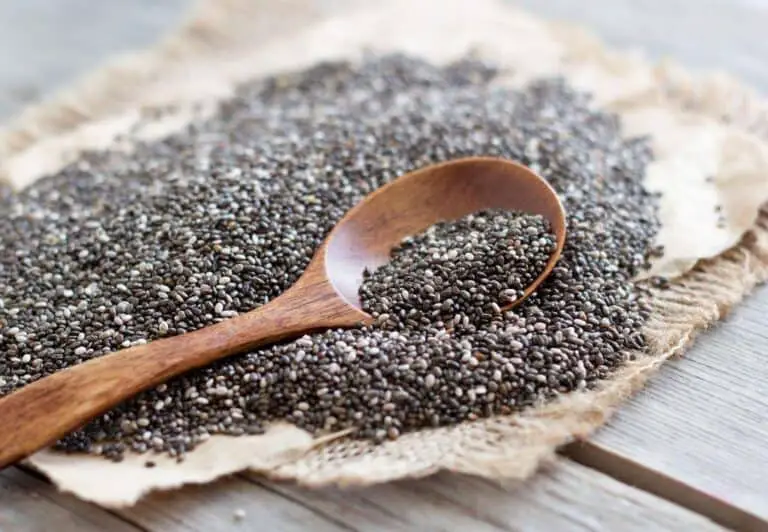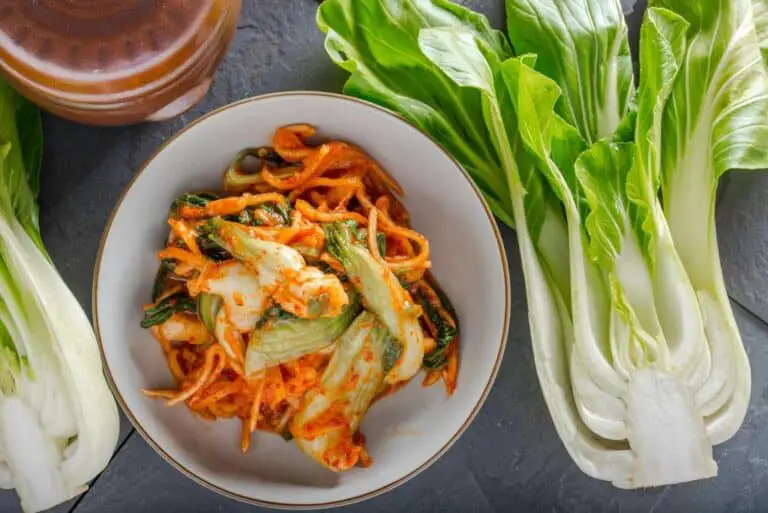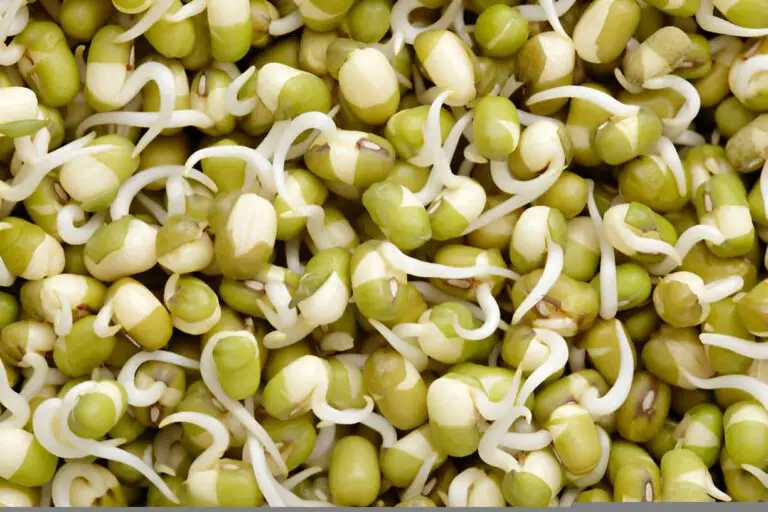Can You Eat Too Many Brussels Sprouts? How Much Is Too Much?
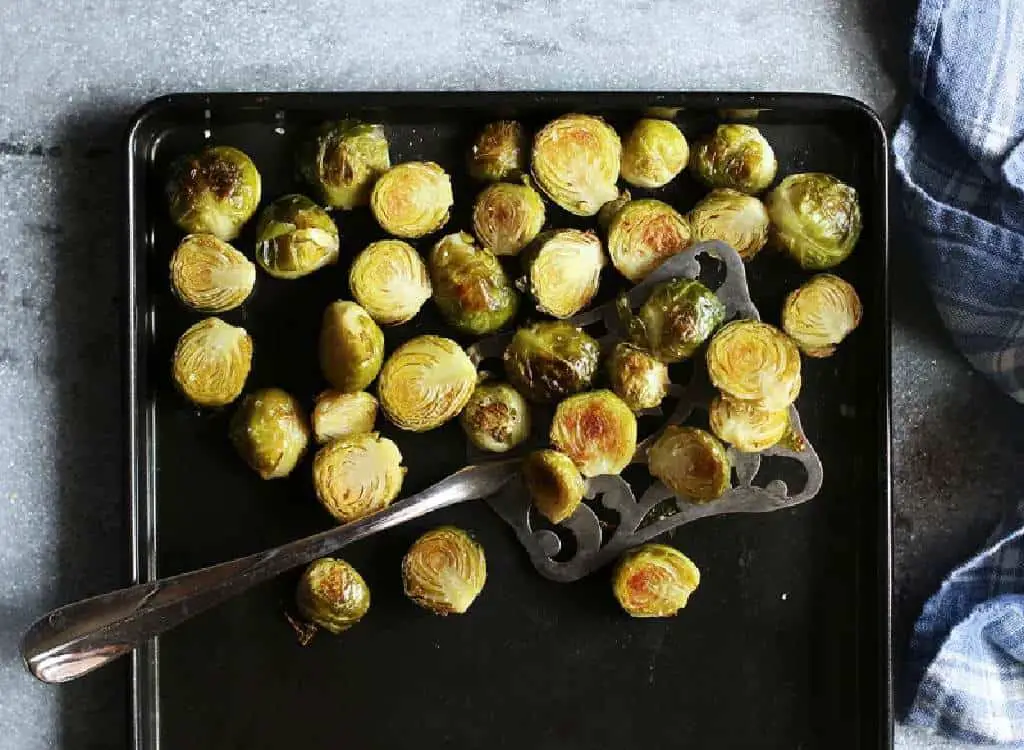
Brussels sprouts, those petite green powerhouses of nutrition, have taken the culinary world by storm. These miniature cabbage-like vegetables are not only packed with vitamins and minerals but also offer a delectable taste that has won over even the staunchest of vegetable skeptics.
But as with any food, the question of moderation arises. Can you indulge in too many Brussels sprouts? How much is too much of this beloved cruciferous delight?
In this article, we embark on a flavorful journey to unravel the mysteries of Brussels sprouts and their consumption limits. We’ll delve into their impressive nutritional benefits, exploring the vitamins, minerals, and fiber they provide to support our overall well-being. But we won’t stop there.
We’ll also venture into the realm of caution, examining the potential side effects of overindulgence and the delicate balance required to enjoy Brussels sprouts to the fullest.
Understanding Brussels Sprouts
Brussels sprouts, often referred to as “miniature powerhouses,” offer a myriad of health benefits. These cruciferous vegetables are rich in vitamins C and K, providing a significant boost to your immune system and promoting healthy blood clotting. Additionally, they are a great source of dietary fiber, aiding digestion and promoting a feeling of fullness.
In terms of minerals, Brussels sprouts are particularly high in folate, which plays a vital role in cell growth and development. They also contain potassium, which helps maintain proper heart function and blood pressure levels. Incorporating Brussels sprouts into your meals can be a delicious way to support your overall well-being.
While Brussels sprouts are undoubtedly nutritious, it’s important to consume them in moderation. Some individuals may experience digestive discomfort due to the presence of raffinose, a complex sugar that can be challenging to digest. However, cooking Brussels sprouts thoroughly can help break down raffinose and reduce its potential effects.
So, whether you enjoy them roasted, steamed, or sautéed, Brussels sprouts offer a range of health benefits that make them a valuable addition to your diet. Just remember to enjoy them in appropriate portions and listen to your body’s response to ensure optimal digestion and overall satisfaction.
Origins and History
Brussels sprouts have a rich history that dates back to ancient Rome. They are believed to have originated in the Mediterranean region and were later cultivated in Belgium, which is how they acquired their name. These tiny green gems are part of the Brassicaceae family and are closely related to other cruciferous vegetables like cabbage, broccoli, and kale.
Appearance, Taste, and Texture
Brussels sprouts resemble miniature cabbages, with tightly packed leaves forming a round shape. They have a distinct flavor that can be described as mildly nutty, slightly sweet, and earthy. When cooked properly, their texture is tender yet firm, providing a satisfying crunch.
Nutritional Profile and Health Benefits
Before we discuss the potential risks of eating too many Brussels sprouts, let’s first highlight their impressive nutritional profile. These miniature cabbage-like vegetables are a rich source of essential nutrients, making them a valuable addition to a healthy diet.
Here are some of the key nutritional benefits of Brussels sprouts:
- Vitamin C: Brussels sprouts are packed with vitamin C, which is crucial for supporting a strong immune system and promoting healthy skin.
- Vitamin K: They are also an excellent source of vitamin K, which plays a vital role in blood clotting and maintaining bone health.
- Fiber: High in fiber, Brussels sprouts can aid digestion, promote satiety, and support a healthy weight.
- Antioxidants: These vegetables contain antioxidants that help protect the body from oxidative stress and reduce the risk of chronic diseases.
- Minerals: Brussels sprouts provide essential minerals such as potassium, manganese, and iron, which are necessary for various bodily functions.
Table of Nutritional Benefit of Consuming Brussels Sprout
| Nutrient | Benefits |
| Vitamin C | Boosts immune system, supports collagen production |
| Vitamin K | Aids in blood clotting, supports bone health |
| Fiber | Promotes digestion, helps maintain healthy weight |
| Folate | Essential for cell growth and development |
| Potassium | Regulates heart function, supports healthy blood pressure levels |
Now that we’ve established the nutritional benefits of Brussels sprouts, let’s address the potential concerns associated with consuming them in excessive amounts.
Can You Eat Too Many Brussels Sprouts? How Much Is Too Much?
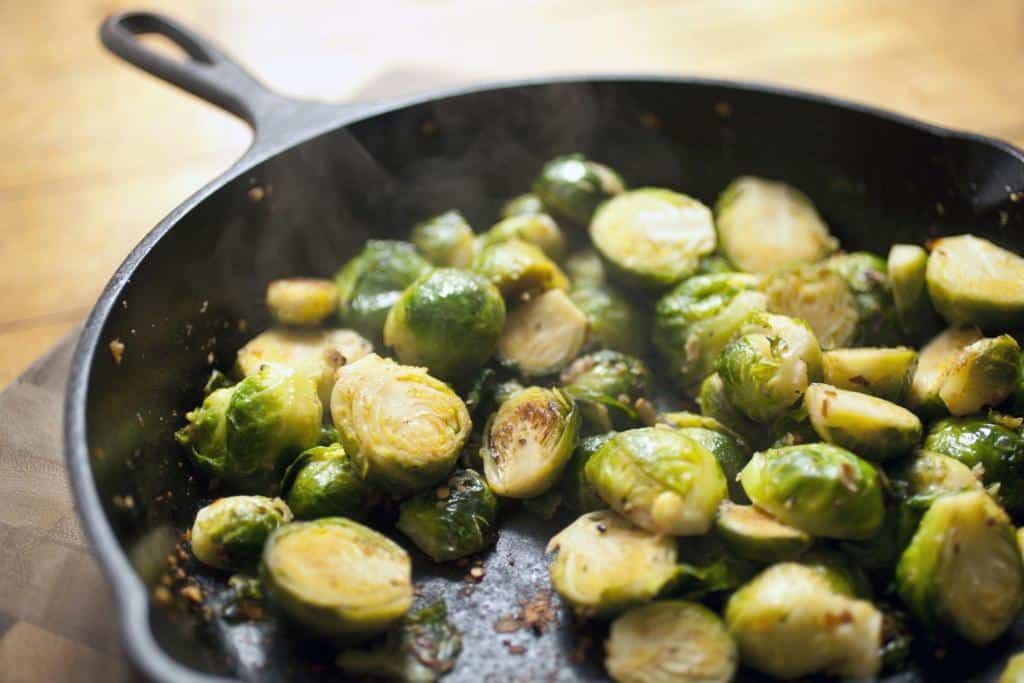
While Brussels sprouts are a nutritious vegetable, it’s important to consider the quantity you consume. While there is no specific limit on how many Brussels sprouts you can eat, consuming excessively large amounts of any food can have potential consequences.
Brussels sprouts belong to the cruciferous vegetable family, which contains compounds called glucosinolates. These compounds can affect thyroid function when consumed in large quantities. However, this is primarily a concern for individuals who already have thyroid issues or are consuming an excessive amount of cruciferous vegetables consistently.
To put things into perspective, a study published in the New England Journal of Medicine reported the case of a woman who consumed an exceptionally large amount of raw bok choy daily, resulting in hypothyroidism.
However, this was an extreme case, and most people can safely enjoy Brussels sprouts as part of a balanced diet without any adverse effects. It’s all about moderation and variety.
As a general guideline, the Centers for Disease Control and Prevention (CDC) recommend consuming 1.5 to 2 cups of vegetables per day, including a variety of types. This includes nutrient-rich options like Brussels sprouts, along with other vegetables such as leafy greens, peppers, and carrots. By diversifying your vegetable intake and practicing portion control, you can enjoy the health benefits of Brussels sprouts without exceeding healthy limits.
By practicing portion control and maintaining a balanced approach to your overall diet, you can savor the goodness of Brussels sprouts without overindulging. Remember, balance is key to maintaining a healthy lifestyle.
Serving Size and Recommended Intake
Recommended Serving Size for Brussels Sprouts
To enjoy the nutritional benefits of Brussels sprouts without going overboard, it’s important to be mindful of the recommended serving size. As a general guideline, one serving of Brussels sprouts is approximately one cup, which is equivalent to about 6 to 8 medium-sized sprouts. However, individual dietary needs may vary based on factors such as age, sex, activity level, and overall health.
Daily Nutritional Guidelines and Proportions
When incorporating Brussels sprouts into your diet, it’s essential to consider the overall balance of your meals. The United States Department of Agriculture (USDA) recommends that vegetables, including Brussels sprouts, should make up about 2 to 3 cups per day as part of a healthy eating pattern. This ensures that you receive a wide array of nutrients from various food sources.
Factors Influencing Individual Dietary Needs
It’s worth noting that individual dietary needs can differ based on several factors. For example, athletes or individuals with higher energy requirements may need larger portions of Brussels sprouts or other vegetables to meet their nutritional needs. Consulting a registered dietitian or healthcare professional can provide personalized guidance based on your specific circumstances.
Overconsumption and Its Effects
Can You Eat Too Many Brussels Sprouts?
While Brussels sprouts offer numerous health benefits, it is possible to consume too many of them. Overconsumption of Brussels sprouts can lead to certain side effects and potential health risks. It’s important to strike a balance and enjoy them as part of a varied diet.
Risks Associated with Excessive Consumption
Excessive consumption of Brussels sprouts can cause digestive issues, primarily due to their high fiber content. Some individuals may experience symptoms such as gas, bloating, and abdominal discomfort. This is more likely to occur when Brussels sprouts are consumed in large quantities or when the digestive system is not accustomed to a high-fiber diet.
It’s worth noting that these symptoms are usually temporary and subside as the body adjusts to the increased fiber intake. However, if you experience persistent or severe digestive issues, it’s advisable to consult a healthcare professional.
These side effects are primarily related to the high fiber and cruciferous nature of Brussels sprouts.
- Digestive Issues: Brussels sprouts are high in fiber, which can be beneficial for digestion. However, eating an excessive amount of fiber can lead to bloating, gas, and stomach discomfort, especially for individuals who are not accustomed to a high-fiber diet.
- Thyroid Function: Brussels sprouts, like other cruciferous vegetables, contain compounds known as goitrogens. Goitrogens can interfere with thyroid function when consumed in large amounts, particularly for individuals with an existing thyroid condition. However, cooking Brussels sprouts can help reduce the goitrogenic compounds.
- Vitamin K Interactions: Brussels sprouts are an excellent source of vitamin K, which aids in blood clotting. If you are taking blood-thinning medications such as warfarin, it’s important to maintain a consistent intake of vitamin K-rich foods, including Brussels sprouts, to avoid potential interactions. Consult with your healthcare provider for personalized advice.
- Oxalate Content: Brussels sprouts, like many leafy greens, contain oxalates, which can contribute to the formation of kidney stones in susceptible individuals. If you have a history of kidney stones, it’s advisable to moderate your intake of oxalate-rich foods, including Brussels sprouts.
Balancing Brussels Sprouts in Your Diet
Incorporating Brussels sprouts into a balanced meal plan is key to enjoying their nutritional benefits without going overboard. Here’s how you can achieve that by eating Brussels sprouts the healthiest way:
- Incorporating Brussels Sprouts into a Balanced Meal Plan: Brussels sprouts can be a delightful addition to your meals. Include them as a side dish, toss them into salads, or use them in stir-fries. They provide a burst of flavor and texture that complements various cuisines.
- Combining with Other Vegetables and Protein Sources: Create a balanced plate by pairing Brussels sprouts with other vegetables and protein sources. This combination ensures you’re getting a variety of nutrients. Consider sautéing Brussels sprouts with colorful bell peppers or roasting them alongside chicken or salmon.
- Moderation and Variety in Vegetable Consumption: While Brussels sprouts are nutritious, it’s essential to vary your vegetable intake. Include other vegetables like broccoli, carrots, and spinach in your diet to ensure a wide range of nutrients and flavors.
Allergic Reactions and Specific Health Conditions
While Brussels sprouts offer numerous health benefits, it’s crucial to be aware of potential allergic reactions and their impact on specific health conditions. Here’s what you should know:
- Allergies to Brussels Sprouts and Related Foods: Some individuals may experience allergic reactions to Brussels sprouts or other vegetables from the Brassicaceae family. Common symptoms include itching, swelling, hives, or even anaphylaxis in severe cases. If you suspect an allergy, consult an allergist for proper diagnosis and guidance.
- Impact on Individuals with Specific Health Conditions: Brussels sprouts can interact with certain health conditions or medications. For instance, individuals with thyroid conditions may need to monitor their intake of cruciferous vegetables, including Brussels sprouts. It’s advisable to consult with your healthcare professional for personalized advice based on your specific health situation.
- Consultation with Healthcare Professionals: If you have any concerns about including Brussels sprouts in your diet due to allergies or specific health conditions, it’s best to seek guidance from a healthcare professional. They can provide personalized recommendations based on your medical history and individual needs.
Preparing and Cooking Brussels Sprouts
To make the most of Brussels sprouts’ flavor and nutritional content, proper preparation and cooking techniques are essential. Consider the following tips:
- Different Cooking Methods and Their Effects on Nutrients: Brussels sprouts can be prepared using various cooking methods, such as roasting, steaming, or sautéing. Each method affects the texture and nutrient content differently. For instance, roasting can bring out a slightly caramelized flavor, while steaming helps retain more of the nutrients.
- Enhancing Flavors and Textures in Brussels Sprouts: Experiment with different seasonings and spices to enhance the taste of Brussels sprouts. Add a sprinkle of sea salt, a drizzle of olive oil, or a dash of lemon juice to elevate the flavors. You can also try adding garlic, balsamic vinegar, or Parmesan cheese for added depth.
- Recipe Ideas and Culinary Tips: Get creative with your Brussels sprouts recipes! Here are a few ideas to inspire you:
- Roasted Brussels Sprouts with Balsamic Glaze: Toss Brussels sprouts with olive oil, salt, and pepper. Roast them in the oven until golden and slightly crispy. Drizzle with a balsamic glaze for a tangy and sweet finish.
- Brussels Sprouts Stir-Fry: Heat a pan with some sesame oil and sauté Brussels sprouts with other colorful vegetables like bell peppers, carrots, and snap peas. Add a splash of soy sauce and a sprinkle of sesame seeds for an Asian-inspired twist.
- Brussels Sprouts and Bacon Hash: Cook bacon until crispy, then remove from the pan. In the same pan, sauté Brussels sprouts with diced potatoes and onions until golden and tender. Crumble the bacon on top for a savory and satisfying dish.
Remember to adjust Brussels sprout cooking times and temperatures based on your preference for softer or crunchier Brussels sprouts. Don’t be afraid to explore different flavor combinations and adapt recipes to suit your taste.
Conclusion
Brussels sprouts are a nutritious and delicious vegetable that can be a valuable addition to a healthy diet. They provide a range of vitamins, minerals, and fiber, contributing to overall well-being. While there is no strict limit on how many Brussels sprouts you can eat, it’s important to be mindful of portion sizes and listen to your body’s response.
By incorporating Brussels sprouts in moderation and maintaining a balanced diet, you can enjoy their numerous health benefits without experiencing any adverse effects.
Remember, variety is key. Alongside Brussels sprouts, include a diverse range of vegetables, fruits, whole grains, lean proteins, and healthy fats in your meals to ensure you receive a wide spectrum of nutrients.
Embrace the goodness of Brussels sprouts, experiment with different cooking methods, and savor their unique flavors while maintaining a balanced approach to your overall dietary intake.
FAQs
Can eating a large quantity of Brussels sprouts be harmful?
Consuming a large quantity of Brussels sprouts can lead to digestive discomfort, such as gas and bloating due to consuming Brussels sprout. However, these symptoms are usually temporary and diminish as your body adjusts to the increased fiber intake.
What are the signs of overconsumption of Brussels sprouts?
Signs of overconsumption of Brussels sprouts may include excessive gas, bloating, abdominal discomfort, and changes in bowel movements. If you experience persistent or severe symptoms, it’s recommended to consult a healthcare professional.
Can I eat Brussels sprouts every day?
Yes, you can include Brussels sprouts in your daily diet as long as you consume them in moderation and maintain a balanced overall diet. Variety is essential, so be sure to incorporate other vegetables and food groups as well.
Are there any risks associated with eating raw Brussels sprouts?
Eating raw Brussels sprouts is generally safe and nutritious. However, some individuals may find them difficult to digest in their raw form. Cooking Brussels sprouts can make them more easily digestible while retaining their nutritional value.
Can Brussels sprouts interact with certain medications?
Brussels sprouts contain vitamin K, which can interact with certain blood-thinning medications. If you are taking such medications, it’s advisable to consult your healthcare provider to ensure a consistent vitamin K intake that aligns with your medication regimen.
Should I limit Brussels sprouts intake if I’m pregnant?
Brussels sprouts can be a nutritious addition to a pregnancy diet due to their high nutrient content. However, it’s important to maintain a balanced diet and consult your healthcare provider for personalized guidance on portion sizes and dietary recommendations during pregnancy.
Are Brussels sprouts suitable for individuals with diabetes?
Brussels sprouts can be a beneficial vegetable for individuals with diabetes. They have a low glycemic index and are rich in fiber, which can help regulate blood sugar levels. However, it’s important to monitor portion sizes and overall carbohydrate intake as part of an individualized diabetes management plan.


